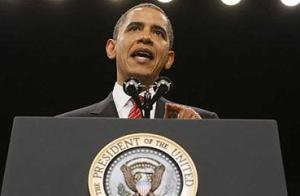Obama commits 30,000 extra troops to Afghanistan

US President Barack Obama has committed to deploying 30,000 more US troops to Afghanistan within the next six months. This will bring the total number of US troops in the troubled country to over 100,000. The proposed pace of deployment will take place much faster than the 12-18 month timeframe that was expected. Speaking yesterday at West Point Military Academy in New York's Hudson Valley, Obama also committed to beginning the withdrawal of troops from Afghanistan in July of 2011.
“I do not make this decision lightly,” said Obama. “I opposed the war in Iraq precisely because I believe that we must exercise restraint in the use of military force, and always consider the long-term consequences of our actions...If I did not think that the security of the United States and the safety of the American people were at stake in Afghanistan, I would gladly order every single one of our troops home tomorrow.”
To date, 918 US troops have lost their lives in the war in Afghanistan, while some estimates put the Afghani death toll as high as 70,000 over the past eight years. Afghan President Hamid Karzai has consistently pleaded with the coalition forces not to use airstrikes in an attempt to lessen civilian casualties. Until recently his calls fell on deaf ears, but newly-appointed US commander General Stan McChrystal has committed to lowering the amount of airstrikes.
Very few Afghans have escaped the horrors of the conflict since 2001. In a recent opinion poll conducted by the International Red Cross, 96% of Afghans stated they had been affected in some way by the conflict with 60% of Afghans affected directly through personal experience. Despite this, 69% of Afghans felt the US invasion was a good thing according to a 2009 BBC poll, with the wave of popular feeling still strongly against the al-Qaida supporting Taliban.
Obama also committed to assisting Pakistan in the fight against al-Qaida. “America will remain a strong supporter of Pakistan's security and prosperity long after the guns have fallen silent, so that the great potential of its people can be unleashed.” Such a commitment will undoubtedly be welcomed by Pakistan's administration; however, the cost of this support along with the ongoing cost of the war effort will undoubtedly be criticised.
The White House estimates that sending 30,000 extra troops to Afghanistan will cost approximately $30bn. As US coffers are severely depleted, questions will have to be raised as to how the funding for the war effort will be maintained over the coming months. The move has, however, finally put an end to months of speculation as to what President Obama's next move would be in relation to the troubled state of Afghanistan. Despite sending an additional 21,000 extra troops in March of this year, Obama has been criticised recently for his seeming procrastination on his decision for further troop increases, with Republican party figures such as John McCain particularly outspoken with their criticism.
However, his decision has been welcomed by certain prominent Republicans such as Karl Rove, who stated he would be “first to applaud” Obama's decision, and former Bush administration official Dan Senor, who called the decision “terrific”. McChrystal also expressed his satisfaction with the decision. “The...review has provided me with a clear military mission and the resources to accomplish our task...The clarity, commitment and resolve outlined in the President's address are critical steps toward bringing security to Afghanistan [and the world].”
On the flipside, prominent liberal figures have come out against the decision. Filmmaker Michael Moore has been particularly vociferous, accusing Obama of “destroying the hopes and dreams” of Americans while New York Times columnist Dan Herbet said “It would have taken real courage for the commander in chief to stop feeding our young troops into the relentless meat grinder of Afghanistan.”
Obama's move is undoubtedly a divisive one. The contradiction of a recent Nobel peace prize winner committing to such a troop surge will undoubtedly be leapt upon by liberal commentators but they will not be alone in their criticism. The more hawkish elements of the American right, such as Dick Cheney, have stated Obama's exit timetable will undermine the troops and the war effort. More important to Obama will be the alienating effect his decision will have on his supporters. Popular support for the president is waning with recent Gallup polls showing his approval rating is down to approximately 51% which represents a 18 point fall since February. However, in his speech he outlined why he felt this move was necessary.
“I am convinced that our security is at stake in Afghanistan and Pakistan. This is the epicenter of the violent extremism practised by al-Qaida. It is from here that we were attacked on 9/11, and it is from here that new attacks are being plotted as I speak. This is no idle danger; no hypothetical threat,” stated Obama in his address. “We must deny al Qaeda a safe-haven. We must reverse the Taliban's momentum and deny it the ability to overthrow the government. And we must strengthen the capacity of Afghanistan's Security Forces and government, so that they can take lead responsibility for Afghanistan's future.”
Whether these motives are justifiable or indeed achievable will undoubtedly be forcefully debated over the coming days. The decision, however, does highlight Obama's ability to make the tough calls that so many thought he wasn't capable of, as well as confirming his ability to take on a military leadership role. Time will tell whether or not his decision was correct.
